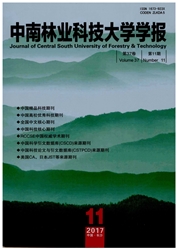

 中文摘要:
中文摘要:
为了抑制桉木干缩,采用全因子试验方法研究抽提工艺对尾巨桉木材干缩性的影响.试验结果表明:碱抽提对尾巨桉木材线性干缩率(径向、弦向)、体积干缩率的影响规律不一,但第6、8、9组方案的碱抽提试样的差异干缩率趋近于1;冷水抽提对尾巨桉木材线性干缩率(径向、弦向)、体积干缩率的影响规律比热水抽提明显,热水抽提材的差异干缩波动幅度比冷水抽提材大,效果较好的工艺组合也明显少;第3、4、7、8、11、12组方案的冷水抽提试样的差异干缩趋近于1,而仅第12组方案的热水抽提试样的差异干缩趋近于1.因此,碱抽提和水抽提可以降低尾巨桉木材干缩性的各向异性.
 英文摘要:
英文摘要:
Eucalyptus veneer is the main raw material of plywood in South China but it easily becomes shrunken, deformed and cracked. Full-factor-test method is used in this paper to study the influence of extraction technology on its wood in order to suppress its shrinkage. Results show that alkaline extraction exerts different influence upon the regularity of its linear shrinkage (radial and tangential) and volume shrinkage but the difference shrinkage among the samples of Groups 6, 8 and 9 approaches 1; that cold-water extraction exerts more obvious influence upon the regularity of its linear shrinkage (radial and tangential) and volume shrinkage than hot-waterl that the veneer from hot-water extraction shows a larger fluctuation range in difference shrinkage than that from cold- water, from which there are few technique groupings that have good effeets ; and that the difference shrinkage of the cold-water extraction samples from Groups 3, 4, 7, 8, 11 and 12 also approaches 1 but that of hot-water only from Group 12 approaches 1. Therefore, alkaline and water extractions can both reduce the anisotropic shrinkage of Eucalyptus urophydis wood.
 同期刊论文项目
同期刊论文项目
 同项目期刊论文
同项目期刊论文
 期刊信息
期刊信息
